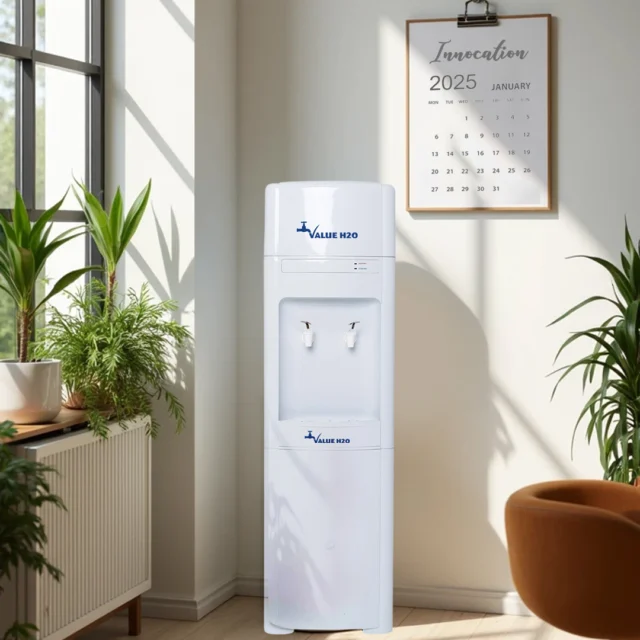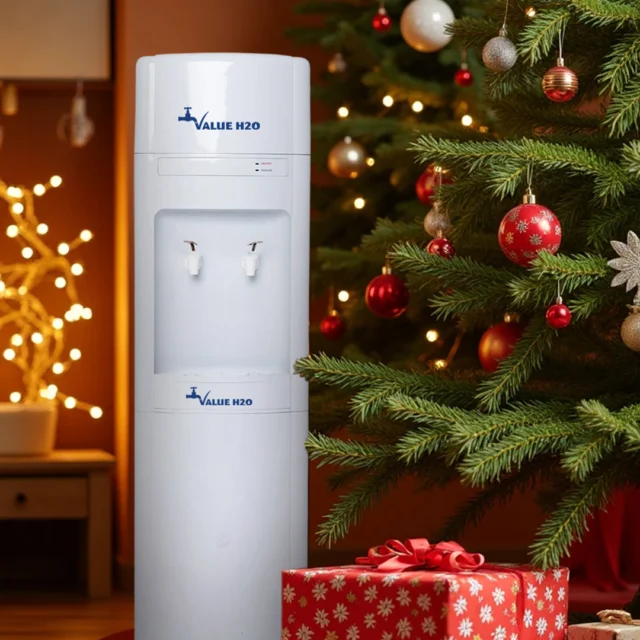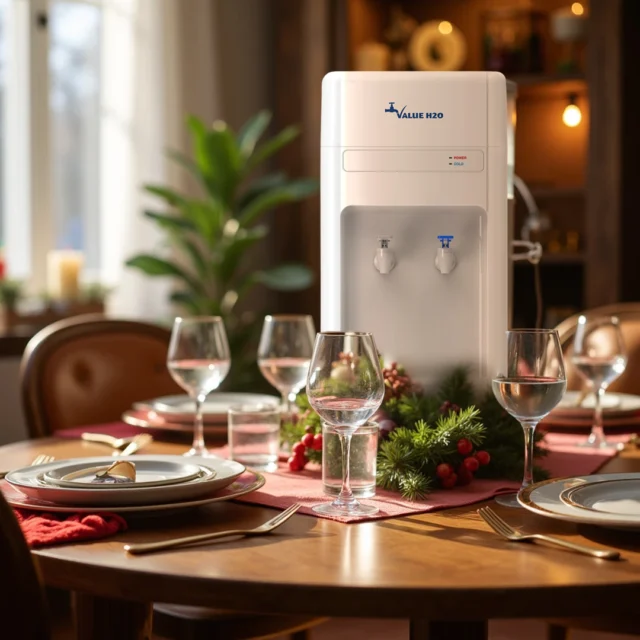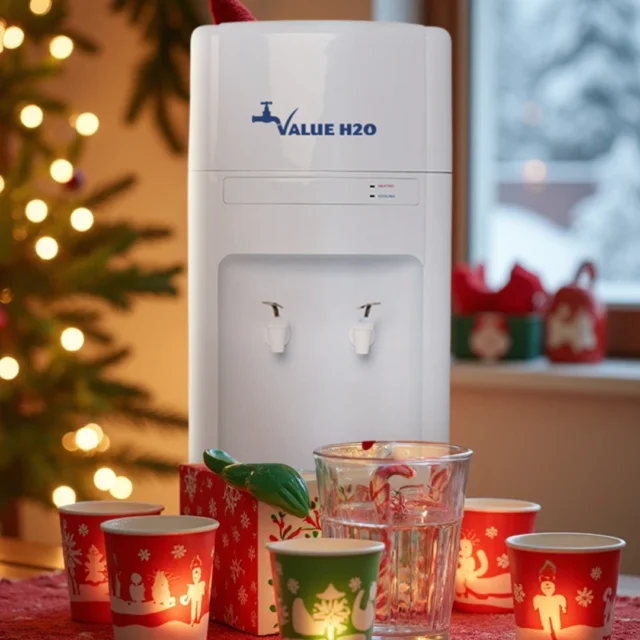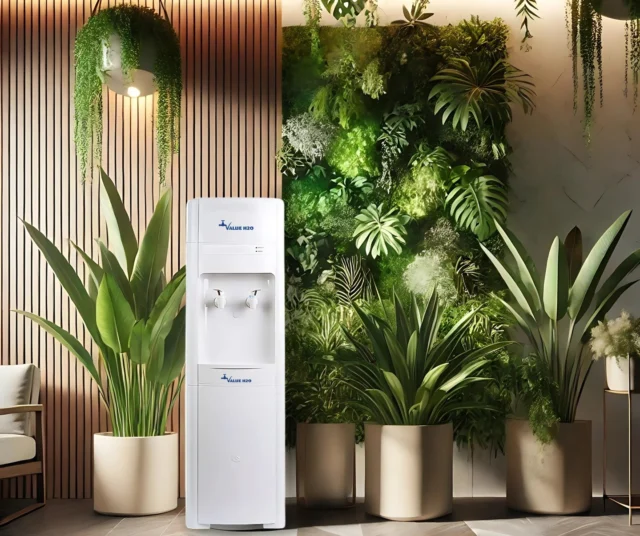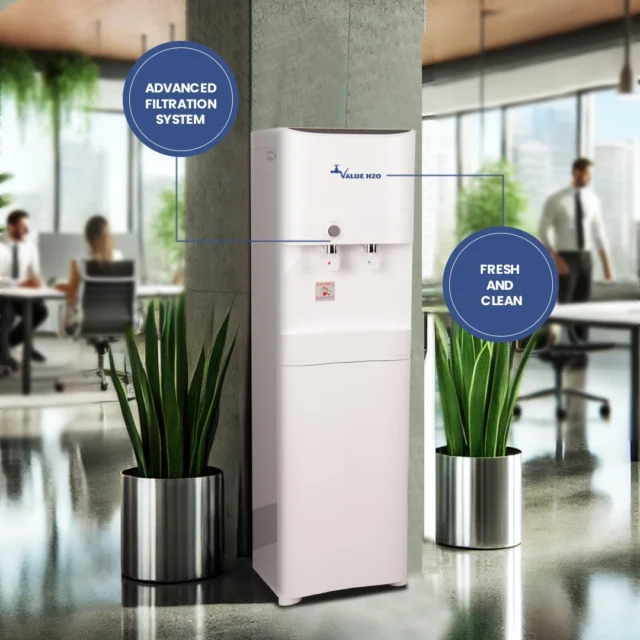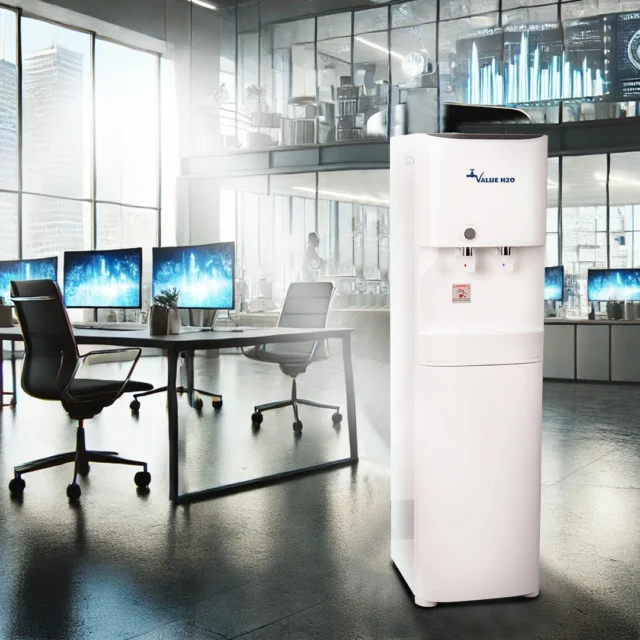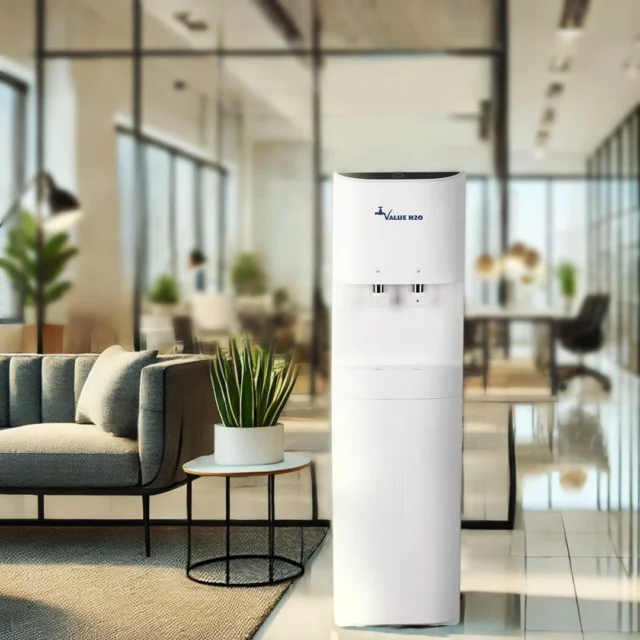
Introduction
In today’s workplace, sustainability is more than just a trend—it’s a responsibility. As businesses increasingly recognise their role in reducing environmental impact, finding practical, eco-friendly solutions for everyday operations has become essential. One of the simplest ways to implement greener practices in the office is by switching to water coolers.
Water coolers not only provide clean and convenient hydration but also offer both cool and hot water options, enhancing the drinking experience while offering a range of environmental benefits that help reduce plastic waste, lower energy consumption, and support a more sustainable future.
What is a Water Cooler?
A water cooler is a versatile device designed to dispense chilled or hot water, making it a convenient and refreshing way to access drinking water in various settings. Commonly found in offices, households, and public spaces, water coolers play a crucial role in promoting healthy hydration and reducing the reliance on single-use plastic water bottles. These devices can be connected directly to the main water supply or use bottled water, depending on the setup and requirements.
Modern water coolers come equipped with a range of features to enhance user experience. Temperature control options allow users to enjoy water at their preferred temperature, whether it’s ice cold or hot. Many water coolers also include advanced filtration systems that ensure the water is clean and safe to drink. Additionally, features like cup holders add to the convenience, making it easy for users to grab a drink on the go. By providing a reliable source of drinking water, water coolers help create a healthier and more sustainable environment.
Types of Water Coolers
When it comes to choosing a water cooler, there are several types available to suit different needs and preferences. Here are some common types:
- Plumbed-in Water Coolers: These coolers are connected directly to the main water supply, providing a continuous flow of chilled or hot water. They are ideal for offices with a reliable water source and can significantly reduce the need for bottled water.
- Bottled Water Coolers: These coolers use large water bottles and are perfect for locations where a main water supply is not accessible. They offer flexibility and can be placed in various spots around the office.
- Filtered Water Coolers: Equipped with advanced filtration systems, these coolers purify the water, ensuring it is free from contaminants. This option is great for offices that prioritize health and sustainability.
- Point-of-Use Water Coolers: Compact and convenient, these coolers can be placed on countertops, making them a space-saving solution for smaller offices. They provide easy access to both hot and cold water.
Each type of water cooler has its own set of advantages, allowing businesses to choose the one that best fits their specific needs and preferences.
Reducing Single-Use Plastic Waste in the Office
One of the most immediate environmental benefits of installing water coolers is the reduction of single-use plastic bottles. Offices that rely on bottled water for hydration contribute to the staggering global problem of plastic waste. With billions of plastic bottles ending up in landfills and oceans each year, the shift to water coolers provides a sustainable alternative. By encouraging employees to use refillable water bottles, businesses can significantly cut down on the use of disposable plastics. Over time, this small change can make a big difference in reducing the office’s environmental footprint. Additionally, using a filtered water cooler not only provides easy access to both cold and hot water but also further reduces single-use plastic waste.
Encouraging a Refillable Culture
Water coolers promote the use of refillable bottles, fostering a refillable culture within the office. When employees have easy access to clean, fresh water throughout the day, the temptation to purchase bottled water diminishes. Water coolers provide healthy drinking water, encouraging employees to use refillable bottles.
This not only saves money but also creates a positive impact on the environment by reducing waste. Providing stylish, reusable bottles for employees, or even setting up hydration stations with water coolers, helps reinforce this eco-friendly practice. Offices can take pride in supporting sustainability while ensuring that staff stay hydrated and productive.
Energy Efficiency and Modern Filtered Water Coolers
Water coolers today, including energy-efficient office water coolers, are designed to be more energy-efficient than ever before. Modern models use advanced cooling and heating technology that minimises energy consumption, allowing businesses to reduce their electricity usage without compromising on convenience.
Many units have eco-modes or energy-saving features, ensuring that water is only chilled or heated when necessary. This makes water coolers a smart choice for offices looking to reduce their overall energy footprint while providing a reliable source of hydration for employees.
Eliminating the Need for Bottled Water Deliveries
For many offices, relying on bottled water deliveries creates additional environmental strain. Not only do these deliveries increase the office’s carbon emissions due to transportation, but they also contribute to excess packaging waste.
Water coolers, particularly plumbed-in systems, eliminate the need for frequent bottled water deliveries. By connecting directly to the office’s water supply, these coolers offer an uninterrupted flow of fresh water, removing the reliance on external delivery services and reducing both emissions and waste. Additionally, choosing to rent a water cooler ensures a reliable and well-functioning product with seamless service options, such as updates and replacements, for hassle-free rentals.
Supporting Workplace Sustainability Goals
As more companies set ambitious sustainability goals, every decision counts when it comes to reducing environmental impact. Installing water coolers is a simple yet effective step toward achieving these goals. By replacing bottled water with an eco-friendly hydration solution, offices can immediately reduce their waste output. Moreover, these small changes can inspire further sustainability initiatives, creating a ripple effect that encourages more responsible practices throughout the organisation.
Improving Office Air Quality and Reducing Carbon Footprint
Water coolers not only reduce plastic waste but can also have an indirect impact on office air quality. By reducing the number of bottled water deliveries and the transportation emissions associated with them, businesses can help improve air quality and reduce their overall carbon footprint. Using spring water in water coolers can further enhance office air quality due to its natural filtration process and ideal mineral composition.
Additionally, by choosing water coolers with energy-efficient features, offices can further minimise their environmental impact, making them part of a comprehensive strategy for greener office operations.
Maintenance and Hygiene
Maintaining and ensuring the hygiene of your water cooler is essential to guarantee the quality and safety of the water it dispenses. Here are some key practices to keep in mind:
- Regular Cleaning and Sanitizing: It’s important to regularly clean and sanitize the water cooler and its components. This helps prevent the buildup of bacteria and other contaminants.
- Replacing Filters: Follow the manufacturer’s recommendations for replacing filters and other parts. This ensures that the filtration system remains effective and the water stays pure.
- Checking Temperature and Pressure: Regularly check the water cooler’s temperature and pressure settings to ensure optimal performance. This helps maintain the quality of the water and the efficiency of the cooler.
- Proper Installation and Maintenance: Ensure that the water cooler is properly installed and maintained to prevent issues such as bacterial growth and contamination. Regular inspections and maintenance can help identify and address potential problems early.
By regularly maintaining and cleaning your water cooler, you can ensure that it continues to provide safe and high-quality drinking water for your office.
Enhancing Employee Engagement with Green Practices
Sustainability initiatives often extend beyond the practical benefits; they can also improve employee engagement. When employees see their workplace making efforts to go green, it fosters a sense of pride and responsibility.
Water coolers are a visible, everyday reminder that the office is committed to eco-friendly practices. This, in turn, can inspire staff to adopt similar habits at home, such as using refillable bottles or reducing single-use plastics. By installing water coolers and promoting their environmental benefits, businesses can create a culture of sustainability that resonates with employees.
Choosing the Right Water Cooler for Your Office
Selecting the right water cooler for your office involves considering several important factors to ensure it meets your needs and preferences. Here are some key points to keep in mind:
- Number of Users: Consider the number of employees in your office. Choose a water cooler that can accommodate the hydration needs of your entire team without frequent refills or maintenance.
- Space Constraints: Evaluate the available space in your office. Opt for a water cooler that fits well within the designated area, whether it’s a compact point-of-use cooler for a small office or a larger plumbed-in unit for a bigger workspace.
- Budget: Determine your budget and find a water cooler that offers the best value for your investment. Consider both the initial cost and any ongoing expenses, such as maintenance and filter replacements.
- Features: Identify the features that are most important to your office. This could include temperature control options, advanced filtration systems, and convenient cup holders. Choose a water cooler that offers the functionalities that will benefit your team the most.
- Maintenance and Hygiene: Select a water cooler that is easy to maintain and clean. This ensures the health and safety of your employees by providing consistently high-quality drinking water.
By carefully considering these factors, you can choose a water cooler that enhances your office environment, supports sustainability, and keeps your team hydrated and productive.
Contributing to the Circular Economy
Water coolers contribute to the circular economy by encouraging the reuse of resources rather than relying on single-use products. In a circular economy, products are designed to have multiple lives, reducing the need for new raw materials and minimising waste.
By promoting the use of refillable bottles and reducing the demand for plastic, water coolers help support this sustainable approach to resource management. Businesses that adopt water coolers are not only reducing their waste but are also contributing to a broader movement toward sustainability.
Conclusion: A Greener Office Starts with Small Changes
Making your office more sustainable doesn’t have to involve sweeping, expensive changes. Sometimes, it’s the small steps that make the biggest difference. Switching to water coolers is a simple yet powerful way to reduce plastic waste, lower energy consumption, and support your company’s environmental goals.
As businesses across Australia strive to create greener workspaces, water coolers offer a practical and effective solution that aligns with sustainability efforts. By making this small change, you can contribute to a healthier planet while ensuring your office stays hydrated and productive.
FAQ’s
Why go green in the office and its benefits on environment?
Going green in the office helps reduce carbon emissions, cut waste, and conserve natural resources. It promotes energy efficiency, lowers the office’s environmental footprint, and contributes to a healthier planet. Additionally, it can boost employee well-being and create a more sustainable workspace.
What are go green solutions that impact our environment?
Go green solutions include switching to energy-efficient lighting, reducing plastic waste, installing water coolers to eliminate bottled water, recycling, using sustainable office supplies, and incorporating renewable energy. These actions help conserve resources, reduce pollution, and lower carbon emissions.
What are the environmental benefits of green building?
Green buildings are designed to use less energy and water, reduce waste, and create healthier environments. They minimise carbon footprints through energy-efficient technologies, sustainable materials, and effective waste management, ultimately contributing to cleaner air and less environmental degradation.
What is an environmental benefit of green spaces?
Green spaces help improve air quality, reduce urban heat, and provide habitats for wildlife. They also absorb carbon dioxide, lower temperatures in cities, and promote biodiversity, contributing to a healthier environment for people and the planet.
